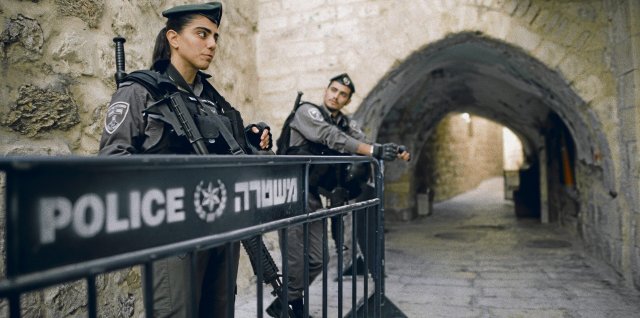Life on the border: who gets through here?
Photo: ZDF/Ran Mendelson
When one thinks of national borders, one usually imagines more or less densely fortified barriers that separate one nation from another. Israel not only has external borders, but also internal borders. So many of them that they are controlled by 8,000 members of the Mishmar HaGvul paramilitary combat unit – a kind of standing army between the police and the army, as well equipped as they are highly motivated. A bulwark of civil defense that the young Avi (Ben Sultan) is supposed to help secure, even if not voluntarily. In the German-Israeli series “Borders” he only joins the border guard squad because he has stress with Arabs at home. Actually, Avi has stress with everyone, everywhere and all the time. In the schoolyard, in front of Dad’s kiosk, in half of the small town of Bat Yam, which is part of Tel Aviv, his impulse control disorder causes arguments.
At the beginning of the eight episodes, however, he is definitely messing with the wrong people. An Arab clan only lets the Jewish teenager live because Chicko (Haim Znati), his drug-dealing friend, stands up for him. But Avi has to promise to leave Bat Yam forever. And so he applies to HaGvul, with the aim of returning to the interior of the country as a uniformed militiaman in order to “beat up Arabs,” as Kobi, one of his new colleagues, puts it. But Israel’s borders are besieged by so many internal and external attackers that it is difficult to distinguish who belongs to whom. During the first mission in Jerusalem’s Old City, it is a Jewish settler who Avi beats bloodily. In the future, he will continue to be caught between the fronts of a divided, gun-toting, vengeful, deeply paranoid country in a permanent state of emergency in which friend and enemy are constantly blurred. Ultimately, Avi clashes not only with the extremists, but also with the moderates on both sides.
Avi’s colleague Miri (Noa Astanjelove) often reminds the hothead to be calm, to no avail. Together with Kobi, the three military cops form a dissonantly conspiratorial trio that is reminiscent of Harry Potter, Hermione Granger and Ron Weasley in the fight against Voldemort. Except that this Israel, despite similarly diffuse friend-enemy schemes, completely lacks the lightness of Harry Potter’s magical world. The eternal Middle East conflict is portrayed too realistically, and the fictional escalation scenario is too reminiscent of the present, of the Gaza war after the massacre on October 7th. Although those responsible from ZDFneo to Movieplus claim that filming was completed long before Hamas’ terrorist attack on Israel, the real conflict can be found in every shot of what was filmed.
When Avi’s strict but fair commander Versano (Shalom Michaelshvili) says, “There have been six attempted attacks in my district in the last two weeks” and adds “if you’re not careful, you die,” it’s also a comment on 130 years of Israeli-Arab politics Discord. But director Meni Yaish, who also wrote the script, does not limit the eight episodes of the series to the core national and religious controversies, but rather keeps civil society in mind. There are already enough problems and dangers, not just organized crime. The neighborhood king Chicko (Haim Znati) didn’t lead his protégé Avi to the gendarmerie out of pure humanism.
And so “Borders” joins an impressive series of Israeli series that have been causing a stir for years, such as “Fauda,” “Hostages” or “Hatufim,” the model for “Homeland.” They all outline socio-cultural and political divisions in the wake of external threats to Israel from Lebanon to Iran.
Ariel A. Blumenthal’s soundtrack is sometimes rock-hard rock music, sometimes nervously sawing electro snippets. In this series, the audience is never told which side to take. Despite the almost maliciously poor synchronization, “Borders” is currently the best thing that could have happened to television, given the global polarization that extends to US universities and German pedestrian passages.
In the ZDF media library
